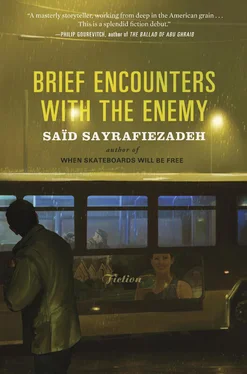In the beginning the experts thought the strike would last only a few days, but after two weeks it was going strong with no end in sight. A neighbor took pity on me and drove me to the supermarket, where I bought enough food to feed a family of five, but other than that, I was unable to leave the neighborhood. I would walk around in the cold afternoons like a convict exiled to Siberia, ignored by the authorities because the region was too vast to flee. There was the empty playground, there was the Buy ’n’ Save, there was the laundromat with the ever present attendant who sat motionless like a bear in a zoo. The wind would whip across the flat land. In the evening I would sit around waiting for Frankie to knock on my door and invite me over. On the rare occasions when he didn’t, I would take out a zucchini and a carrot from the refrigerator, sauté them in a pan, and put them on top of a bed of pasta, then cover everything with an excessive amount of Parmesan cheese. As I ate, it was impossible for me to avoid reflecting on the possibility that the bus strike would never end, which led me to consider that the general condition of my life would also remain as it was.
The day after Ned Frost gave me the E.T . letter, I walked into his office unannounced and said that I didn’t want to receive any more letters like that or I would sue him for sexual harassment. It seemed like the right thing to say. From his desk he stared up at me sheepishly, silently. He looked like a balloon, as if someone had blown up a shirt and tie.
“There is a warmth I’ve felt toward you,” he said poetically.
The prospect of being entrapped in a romantic exchange unnerved me. “I don’t care about your warmth, Ned,” I said.
“And there is a warmth,” he continued as if I hadn’t said a word, “yes, that I have felt from you.”
I said nothing.
“Would you deny,” he suddenly demanded, “that you have ever had a warm thought for me?” There was accusation in his voice. I looked back at him sternly. Then he burst into tears. “I’ve never felt as close to anyone as I do toward you,” he managed to get out.
It was hard not to be moved by this, and I felt sorry for him and wondered if I was being needlessly cruel. But I had to remain resolute — for his own good. “Just consider yourself warned,” I said.
The next day, as I was trying to map out a particularly complicated cloverleaf interchange, the printer beside me began to hum. This time it was only one page, and it contained a single line: “I cannot live one more day with hearts on edge.” An hour later I was fired.
There were no basketball games on television, so Frankie and I sat around eating orange chicken while he regaled me with stories about an old girlfriend that he had been madly in love with but had failed to marry because he couldn’t stop drinking.
“Black,” he said. “She was … black.” Then he paused. “I like brown skin.” He shrugged. The matter was out of his control.
We channel-surfed for a while. I kept hoping he’d stop on the spring break swimsuit movie, but all he did when we came around to it was say, “Bullshit.” We watched a bit of the local news coverage of the strike, in which the same three video clips were aired repeatedly: the transit chairman in a suit and tie, calmly laying out his side of the story, which seemed fair enough; a group of picketers dressed in hats and scarves and gloves, standing in an empty parking lot, chanting wildly as they waved their signs; and finally, a man-on-the-street interview with a soldier who’d just been called up and who said, looking directly into the camera, “I understand you want more money, but now isn’t the time.” The anchorman, who’d been delivering the news in the city for fifty years and looked near death, said that the day’s negotiations had ended “acrimoniously.”
“What’s that mean?” I asked Frankie.
“What?”
“ ‘Acrimonious,’ what’s it mean?”
But he had landed on an old black-and-white foreign movie. “I know this!” he shouted. “I know this!”
I had never seen the film, and since it was half over and since it was foreign, I had no idea what was going on and didn’t care enough to try to figure it out. I kept waiting for Frankie to switch over to something else, but he never did, so I just sat there quietly while it played. When we got to the end, with the main character sobbing and crawling around drunkenly on his hands and knees, I snorted derisively and turned to Frankie, who was staring at the screen with tears in his eyes.
“He … he did it … to himself. To himself!”
Then, with all the energy he had, Frankie pushed himself to a standing position, unzipped his pants, and grabbed ahold of his pot. “Pardon me,” he said.
On the twenty-eighth day of the strike, I decided I couldn’t stand my confinement any longer. Early that morning I set off with a small bag of food to walk as far as I could. I crossed through the underpass quickly, without incident, and out of the neighborhood. The city, unfortunately, had not been designed for walking, and there would come times when I’d find myself trying to circumvent a freeway, or circling back from a dead-end street, or going for long stretches without a sidewalk. The air was chilly, but the sky was bright, and I could feel that spring was nearing. I kept the pace brisk and lively. But after about an hour, my energy began to wane. I pressed on, trying to ignore the nagging awareness that I would have to retrace every one of the steps I was now taking. I walked through parks and neighborhoods and shopping centers, many of which I had never seen or known existed. There were people out, but the city felt more vacant than usual. After the factories had closed, anybody who had the means picked up and moved away, leaving the city with empty smokestacks and the second oldest population in the country. What was I still doing here? I was too young to inhabit the ends of the earth. Several cars passed me going the other way, and I considered sticking my thumb out and hitching a ride back home, but I wasn’t sure if people did that anymore.
I walked along the boulevard that divided the east side of the city from the west side, and I passed the restaurant I had worked in as a short-order cook. It wasn’t open yet for business, but the windows were already fogged with steam from the kitchen. An American flag hung in the front window next to a sign advertising half-price brick-oven pizza on Thursday nights. I remembered vividly the grueling twelve-hour shifts, the beer reward at the end of the night, the pretty waitresses, the black cooks who had gotten addicted to crack. If we wanted a meal, we had to pay for it, so I would surreptitiously cook myself food and then eat it while hiding in the bathroom stall, sitting on the toilet. At the time I thought that I had managed to even the playing field.
Two hours after I had begun my journey, I realized I was lost. I turned back the way I came, but the way I came could no longer be discerned. There were four streets curving and winding their way toward me. I chose one and followed it for ten minutes until I was certain it was the wrong one, and then I turned back around. But now I was faced with four more streets, each one looking identical and vaguely familiar. I passed through a wealthy, tree-lined neighborhood with curb-side mailboxes into a neighborhood that was not so wealthy but still had trees. I walked along railroad tracks for a while. The sun was starting to drop and it was getting colder. My feet and legs ached and I wanted to sit, but to sit at a time like this felt irresponsible. Beside me were woods, and beyond them I could make out the river. This was the true boulevard of the city that for decades had brought coal in and taken goods out. The glory years. If I waited long enough, I’d probably see a gunship float past.
Читать дальше












